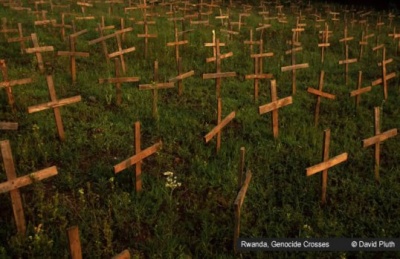Difference between revisions of "Rwanda"
| (One intermediate revision by the same user not shown) | |||
| Line 1: | Line 1: | ||
=== 1994 === | === 1994 === | ||
[[File:Rwanda.jpg|400px|thumbnail|left]] | [[File:Rwanda.jpg|400px|thumbnail|left]] | ||
| − | On April 6 1994, members of the Hutu ethnic community began slaughtering Tutsis, a rival ethnic group. As the brutal killings continued, the world stood idly by and watched the massacre. Lasting more than three months, the Rwandan genocide left approximately 800,000 Tutsis and Hutu sympathisers dead. Out of a population of 7.3 million people, the number of genocide victims is estimated at 1,174,000 in 100 days (7 every minute). Thousands of widows, many of whom were subjected to rape, are now HIV-positive. There were about 400,000 orphans. The Rwanda genocide ended when the Rwandan Patriotic Front took over the country. The massacre is widely recognised as one of the greatest recent failures of international peace-making efforts. | + | On April 6 1994, members of the [[Hutu]] ethnic community began slaughtering Tutsis, a rival ethnic group. As the brutal killings continued, the world stood idly by and watched the massacre. Lasting more than three months, the Rwandan [[genocide]] left approximately 800,000 Tutsis and Hutu sympathisers dead. Out of a population of 7.3 million people, the number of genocide victims is estimated at 1,174,000 in 100 days (7 every minute). Thousands of widows, many of whom were subjected to rape, are now HIV-positive. There were about 400,000 orphans. The Rwanda genocide ended when the Rwandan Patriotic Front took over the country. The massacre is widely recognised as one of the greatest recent failures of international peace-making efforts. |
The travesty is that this act should never have occurred in the 20th Century - this is the reason the Convention was created in the first place. | The travesty is that this act should never have occurred in the 20th Century - this is the reason the Convention was created in the first place. | ||
[[Category:Acts of Genocide since World War II]] | [[Category:Acts of Genocide since World War II]] | ||
Latest revision as of 08:04, 1 April 2014
1994[edit]
On April 6 1994, members of the Hutu ethnic community began slaughtering Tutsis, a rival ethnic group. As the brutal killings continued, the world stood idly by and watched the massacre. Lasting more than three months, the Rwandan genocide left approximately 800,000 Tutsis and Hutu sympathisers dead. Out of a population of 7.3 million people, the number of genocide victims is estimated at 1,174,000 in 100 days (7 every minute). Thousands of widows, many of whom were subjected to rape, are now HIV-positive. There were about 400,000 orphans. The Rwanda genocide ended when the Rwandan Patriotic Front took over the country. The massacre is widely recognised as one of the greatest recent failures of international peace-making efforts. The travesty is that this act should never have occurred in the 20th Century - this is the reason the Convention was created in the first place.
